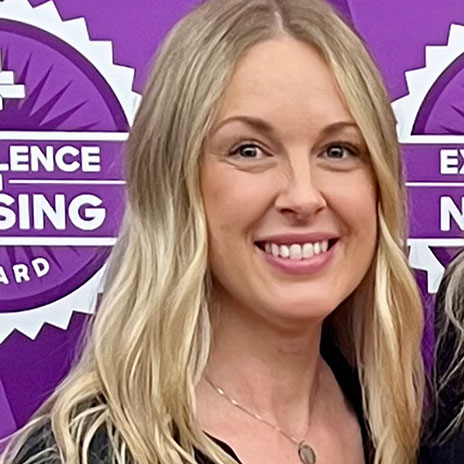
“Nothing else compares to what Dallas College is offering,” said Kady Linnea Klasne, a mother of three who works full time as a registered nurse while taking online RN-B.S.N. classes.
Media Contact: Debra Dennis;
DDennis@DallasCollege.edu
For immediate release — Oct. 14, 2024
(DALLAS) — Kady Linnea Klasne found herself looking on helplessly as someone needed medical care, but she lacked the skills and training to help others. Klasne is now celebrated and honored for her excellence as a registered nurse. She has worked closely with patients — assisting them through some of their most challenging medical problems.
Trained and assigned to the intensive care unit of a Dallas-area hospital, where she has been lauded with several health care awards, she now wants something else — to add a bachelor’s degree to her name showing that she has expanded her knowledge and skills and is now qualified to seek out other nursing opportunities, including teaching.
“This program is great. It’s convenient. Financially, this was the best way to go. Nothing else compares to what Dallas College is offering,” said Klasne, a mother of three who works full time while taking online classes.
Klasne, who has an associate degree from Dallas College, is among the first students to enroll in the baccalaureate program. She is on target to graduate next year.
She has seen trauma up close and marvels at what happens when professionals are calm and competent.
“I started my nursing career during COVID, which made everything challenging, but I got through it. The options with a bachelor’s degree are endless. There is so much to do besides bed-side nursing.”
Health care is among the top rising careers that come with an added promise to improve patient outcomes, said Dr. Chiquesha Davis, academic chair for the RN-B.S.N. Nursing program. Texas is among many states grappling with addressing nursing shortages.
The U.S. Bureau of Labor Statistics projects that more than 275,000 additional nurses are needed from 2020 to 2030, and that employment opportunities for nurses will grow at 9%, faster than all other occupations from 2016 through 2026.
Affordable programs like the advanced nursing degree at Dallas College give health care students a jump on their careers and address the staffing shortages for nurses.
Since its B.S.N. degree launched, Dallas College has been allowed by the Texas Board of Nursing to enroll as many students as the college can handle, provided there are sufficient teachers to guide them through the curriculum. The B.S.N. program will make Dallas College a higher education institution of choice, attracting an array of students from varied backgrounds.
These degrees are game changers for those looking to fulfill a variety of occupations, according to Dr. Davis.
“We don’t have a cap anymore. We can take as many as we like,” Dr. Davis said. “The program is growing. Now, our nursing students in the associate program don’t need to go and look at another college or university to get their bachelor’s degree. They can stay with us and get a very affordable and value-based bachelor’s degree.”
The first class enrolled in the fully online program are on a 12-month fast track and projected to graduate in summer 2025.
A robust group of 25 is enrolled in this Fall semester, Dr. Davis said.
Students who obtain a bachelor’s degree from Dallas College can enter several health care settings including school nursing, specialized clinics or underserved areas such as rural communities.
Dallas College’s curriculum includes the option for the student to begin the path for a certification that allows students to also work as bilingual medical interpreters. They must be fluent in Spanish and English to become a certified Spanish interpreter.
Bilingual students are hard sought because they play dual roles in the health care industry — providing health care and interpreting on behalf of patients and medical staff, Dr. Davis said. She is hoping that at least 10% of the students enrolled in the B.S.N. program will consider completing the language certification.
“In the hospitals, they need more language (interpreters). We have identified this as a need to have interpreters on the radar,” Dr. Davis said.
Spanish is the only language offered at this time, but other languages, including Russian and Mandarin, may be considered.
Additionally, Dallas College is building partners with other colleges to help the B.S.N. students pursue advanced degrees in health care. Talks are underway with surrounding graduate schools to grabble this uncharted territory so Dallas College B.S.N. students can pursue master’s degrees in health care.
Learn More About the Bachelor of Science in Nursing (RN-B.S.N. track).
# # #
About Dallas College
Celebrating its 60th anniversary in 2025, Dallas College consists of seven campuses — Brookhaven, Cedar Valley, Eastfield, El Centro, Mountain View, North Lake and Richland — plus a dozen centers located throughout Dallas County. As one of the largest community colleges in the U.S., Dallas College offers online and in-person learning, serving more than 127,000 credit, workforce and continuing education students annually. Students benefit from partnerships with local school districts, four-year universities, industry and community leaders. Dallas College offers associate degree and career/technical certificate programs in more than 100 areas of study, as well as bachelor’s degrees in education and nursing. As the largest provider of dual credit in Texas, Dallas College serves 30,000 high school students through 63 dual credit programs.